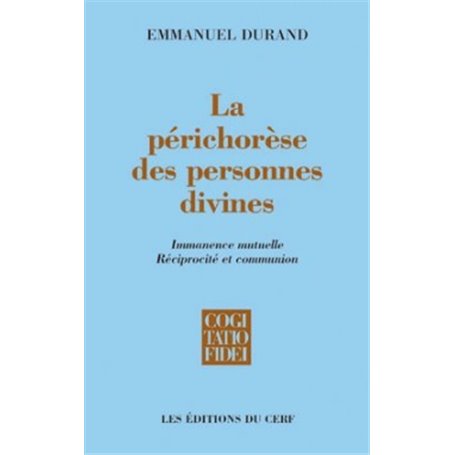La Périchorèse des personnes divines
Format BrochéAuteur : Emmanuel Durand

Livraison en Guyane tout compris

Retours et SAV simplifiés

Garantie Isleden
Description
Les théologiens contemporains usent volontiers de la " périchorèse " comme d'un mot magique, emprunté aux Pères Grecs pour repenser l'unité de la Trinité. Cette notion évocatrice et quelque peu mystérieuse suscite aujourd'hui un réel enthousiasme, et certains y voient spontanément un outil aux multiples ressources, sans que l'on sache toutefois ce qu'elle recouvre exactement. Aussi, d'autres relisent déjà cet engouement récent comme la séduction exercée par une solution de facilité. Le premier objectif de cet ouvrage est de poser un discernement théologique et de redéfinir en conséquence le concept avec rigueur et créativité. Il est pour cela nécessaire de délimiter avec précision les " fondements " et l'" actualisation " possible de cette notion. Par une enquête patristique approfondie, la base des développements ultérieurs se laisse reconnaître dans le sens fixé par Jean Damascène, à savoir " l'immanence mutuelle du Père, du Fils et du Saint-Esprit ". Cependant, entre les Pères et nous, une réception médiévale diversifiée produit les premières élaborations conceptuelles autour de la circumincession (Bonaventure) ou de l'intériorité réciproque des trois personnes divines (Thomas d'Aquin). Par delà ces analyses, l'ouvrage élabore une proposition pour une théologie renouvelée de la périchorèse trinitaire, refondée sur l'Évangile et en prise avec les enjeux oecuméniques de la pneumatologie. Le résultat principal est d'actualiser et de développer le motif de la tradition comme " réciprocité " relationnelle et " communion " interpersonnelle, afin de préciser son meilleur rôle possible dans une approche du mystère trinitaire comme vie éternelle. Emmanuel Durand, dominicain, est professeur de théologie systématique au Collège Universitaire Dominicain d'Ottawa. -- Contemporary theologians often use the word 'perichoresis', borrowed from the Greek Fathers, as though it were a magic formula for rethinking the unity of the Trinity. This evocative and slightly mysterious notion incites real enthusiasm today, some seeing in it a multi-purpose tool, even though we do not know exactly what it represents. Others see the recent fervour as no more than the temptation of an easy answer. The first aim of this book is to define the concept with rigour and creativity by placing it under theological inspection. To do this, it is necessary to clearly establish the boundaries of the possible 'foundations' and 'modernity' of the notion. An in-depth patristic investigation reveals the basis of later developments in meaning, as established by John Damascene, i.e. 'the mutual immanence of the Father, the Son and the Holy Ghost'. However, between the Fathers and our times, differing medieval receptions have intervened, producing the first conceptual elaborations on the circumincession (Bonaventure) or the reciprocal interiority of the three divine beings (Thomas Acquinas). Apart from these interpretations, this book proposes a renewed theology of the 'perichoresis' of the trinity, based on the Gospels and in keeping with the ecumenical challenge of pneumatology. The main achievement is to modernize and develop the motif of tradition as relational 'reciprocity' and 'communion' between human beings, in order to establish its most positive role in an approach to the mystery of the Trinity as eternal life.
Caractéristiques
Caractéristiques
- Format
- Broché
- Auteur(s)
- Emmanuel Durand
- Collection
- Cogitatio Fidei
- Date de parution
- 01/03/2005



